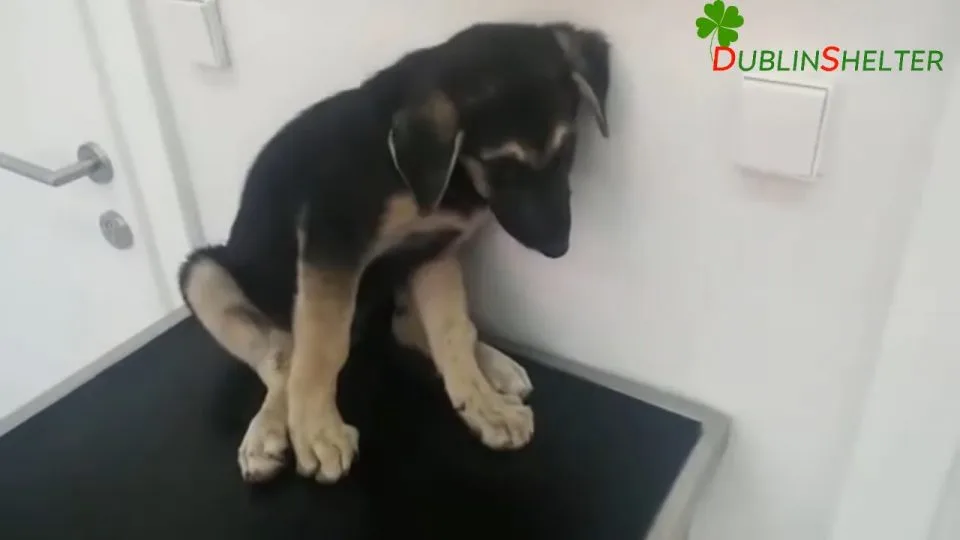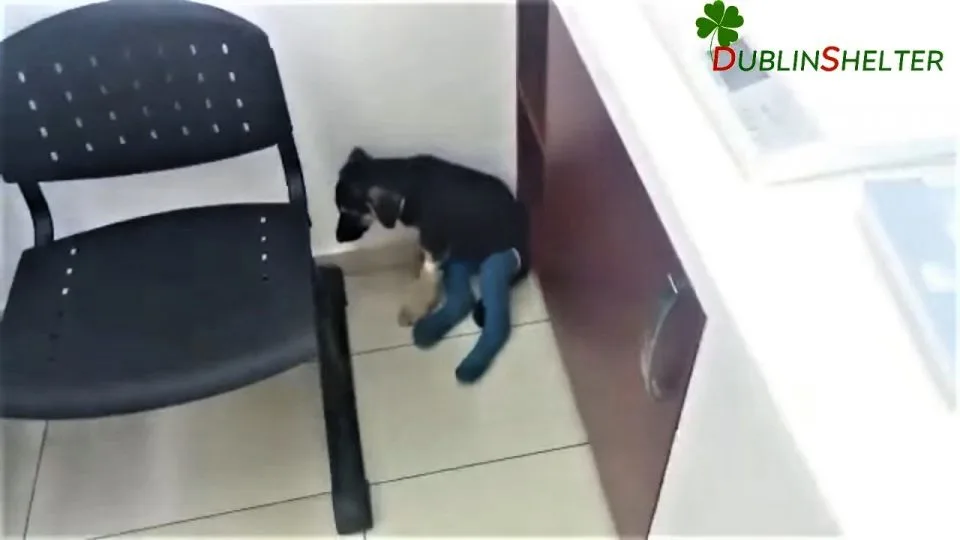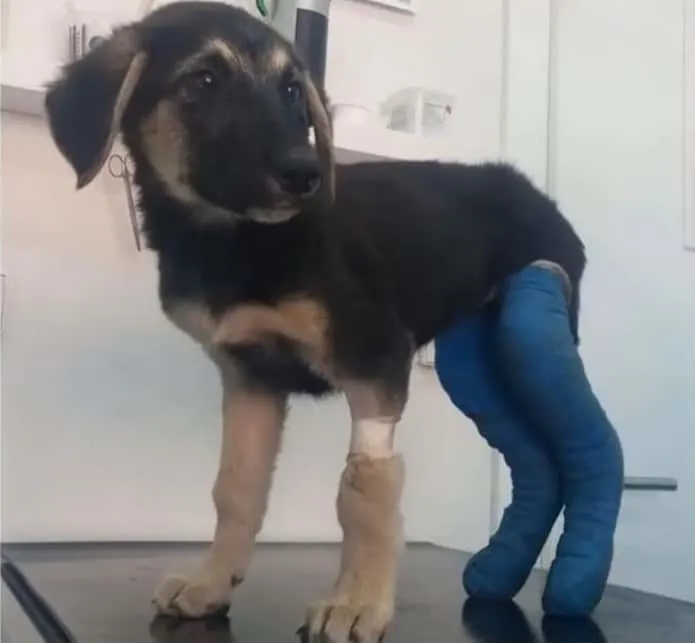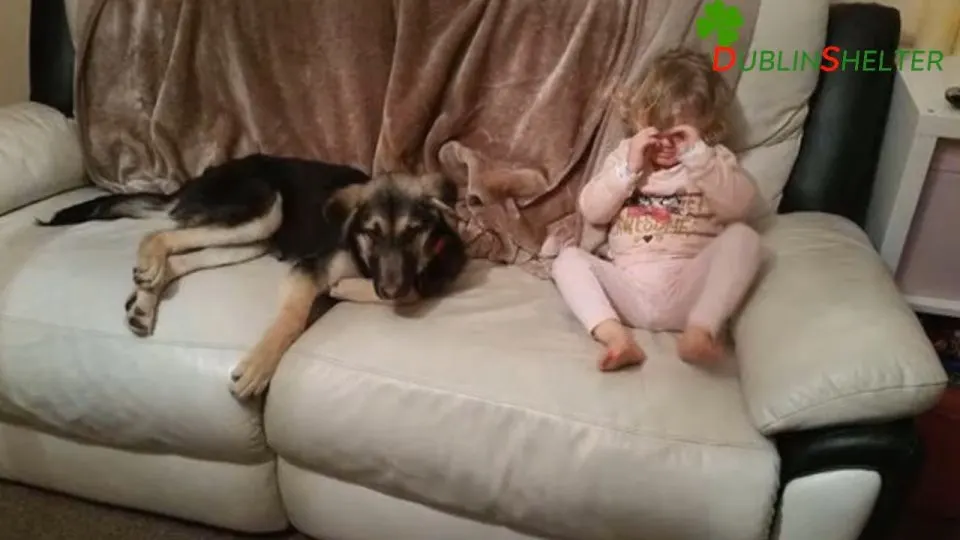What would you do if you received a distress call about an injured and crying puppy on the side of the road? Or, saw one while walking or perhaps driving by?
Sadly, we constantly hear stories about abandoned dogs wandering around in search of rescue. These poor dogs are often either sick or injured, and require urgent medical help.
Not a lot of people are capable of or willing to help, but thankfully, there always seems to be at least one kind soul that does everything in their power to help these animals in need.
One of them is Edina Pasic, a woman who answered a call about a distressed puppy that was seen dragging its weak body across the grass… Without any hesitation, she went to save this poor animal.

When Edina arrived at the place, she found a heartbreaking scene. This beautiful little puppy was unable to stand, and was just painfully dragging its weak and injured body across the grass.
This scared puppy, whom they later named Rossie, was crying from pain and desperately trying to crawl away from her because she was terrified. At first glance, her legs were likely broken, probably in a car accident, but no one could tell for sure.
With every move she made, she was crying more and screaming in pain. “She looked at us with tears in her eyes, as if she was saying… please, help me”, said Edina.
It was not easy to gain her trust because Rossie was very scared of people, and didn’t know that they were there to help her. It’s heartbreaking to think of what this little being had to go through to be so afraid of people.
Seeing that Rossie needed urgent medical help, Edina and her friends rushed her to the veterinary clinic.

Even at the veterinary clinic, Rossie was incredibly shy and afraid, trying to hide in the corner from everyone.
Sadly, the X-rays showed that both of her hind legs were indeed broken, and she would need surgery to have fixators installed.
There was a long road to recovery ahead of little Rossie, but thankfully, now she had a lot of people around her willing to help, take care of her, and show her love that she probably had never experienced before.
On The Road To Recovery

The next day, Rossie had the surgery, which was luckily very successful, and she had fixators installed on both hind legs. After a few days of sleeping and resting, this brave girl was ready to get back on track.
Already, on the third day after the operation, Rossie was slowly starting to walk again, which was incredible. She was still scared of people around her, but she was slowly making some progress.
Her bravery and resilience amazed everyone. “It’s unbelievable what these little souls can survive”, comments Edina. “She needs a lot of love, but I’m sure she also has a lot of love to give.”
Little by little, she was gaining trust in people and being less scared. She was still a shy baby girl, though.

38 days after the surgery, Rossie had made full recovery, and she was able to walk normally on all four paws. It was remarkable.
The vet said that she recovered completely, and she also received vaccines against any infectious disease. Finally, this beautiful girl was completely healthy.
Despite her shyness, she overcame her fear of people, and she loves to cuddle.

Eventually, it was time for Rossie to start her new life. Although everyone was sad to let her go, they were still happy that she completely recovered, both physically and emotionally.
Rossie showed great bravery and resilience, and went from a scared and crying little girl to the happy and playful puppy that she was always supposed to be.
A loving family from England adopted Rossie. Now that she has gotten over her fears, she’s loving all the cuddles and love she can get.
Ever woken up to a soggy surprise in your bed courtesy of your furry friend? It’s a common issue that many dog owners face. You’re not alone in wondering why your pup has chosen your bed as their personal restroom. Understanding the reasons behind this behavior can help you address the issue effectively. Dogs communicate in their unique way, and sometimes, their message might be a bit too literal for your liking.
Your bed holds a significant scent that goes beyond just comfort for your dog. From separation anxiety to marking their territory, there could be various reasons why your canine companion has taken a liking to your sleeping space. It’s essential to decipher the underlying cause to find a solution that benefits both you and your four-legged friend.
Understanding Canine Behavior
The Role of Scent Marking in Dogs
Dogs have a keen sense of smell, and they use it to communicate with their surroundings. When a dog pees on your bed, they might be marking their territory. This behavior is a natural instinct for dogs and helps them establish boundaries. By scent-marking, dogs leave behind their scent which signals to other animals that this area belongs to them.
Anxiety-Induced Urination
Anxiety can be a significant factor in why your dog pees on your bed. Dogs may urinate in a familiar spot, like your bed, when they are stressed or anxious. This behavior can be a result of separation anxiety, fear, or even a change in their environment. Understanding your dog’s triggers for anxiety-induced urination can help you address the issue and provide the necessary support to help them feel more secure.
Medical Reasons Behind Inappropriate Urination
Urinary Tract Infections in Dogs
Urinary tract infections (UTIs) can cause your dog to urinate in inappropriate places like your bed. When a dog has a UTI, it experiences discomfort while urinating, leading it to associate the relief of urination with the bed or other familiar spots. If your dog suddenly starts peeing in your bed and shows signs of straining or discomfort while urinating, a UTI could be the reason. It’s essential to consult your vet promptly to diagnose and treat the infection to stop this behavior.
Incontinence and Age-Related Issues
Incontinence in dogs, especially in senior dogs, can result in bed-wetting. As dogs age, their bladder control may weaken, causing them to have accidents, including on your bed. Female dogs may also experience incontinence due to hormonal imbalances, leading to involuntary urination. If your older dog is peeing in your bed, it could be due to age-related incontinence. Consulting with your vet can help manage this condition and find solutions to prevent further accidents on your bed.
Territorial Claims and Dominance Theory
Establishing Territory Through Urination
When your dog pees on your bed, it might be their way of marking their territory. Dogs have scent glands in their paws, which means when they paw at your blankets, they could be leaving behind their scent, claiming your bed as their own. This behavior is a way for them to establish boundaries and assert dominance over their territory.
Misconceptions About Dominance and Peeing
Contrary to popular belief, dominance theory isn’t the only reason your dog may urinate on your bed. While some dogs may exhibit dominant behaviors, such as marking their territory, it’s essential to consider other factors like medical issues or anxiety that could also lead to this behavior. Understanding your dog’s specific triggers and addressing them appropriately can help prevent accidents in the future.
Behavioral Triggers and Environmental Factors
Lack of Proper House Training
If your dog pees on your bed, one common reason could be a lack of proper house training. Dogs need to be trained to understand where it’s appropriate to relieve themselves. If they haven’t been adequately trained or are confused about where they should go, accidents can happen, even on your bed.
Changes in the Household
Changes in your household can also trigger your dog to urinate on your bed. Dogs are creatures of habit and can get stressed or anxious by changes in their environment. This stress may lead them to act out by peeing on your bed as a way to cope with the changes. Be mindful of any recent changes in your home that could be causing distress to your furry companion.
How to Discourage Your Dog From Peeing in Your Bed
Positive Reinforcement Training
To discourage your dog from peeing in your bed, positive reinforcement training is key. When your furry friend pees in the right spot, like outside or on pee pads, reward them with treats, praise, and affection. This teaches them where it’s appropriate to relieve themselves. Consistency is crucial – be patient and reinforce good behavior every time.
Creating a Comfortable Separate Sleeping Space for Your Dog
Provide your dog with its own cozy sleeping area to deter them from urinating on your bed. Choose a comfortable dog bed or crate in a quiet corner of your bedroom or a nearby room. Make this space inviting with your dog’s favorite toys, blankets, and a familiar scent. By creating a comfortable and designated sleeping spot for your dog, you can help prevent accidents on your bed.
Conclusion
Understanding why your dog pees on your bed involves considering various factors like separation anxiety, territorial instincts, and changes in the household environment. It’s crucial to address these behavioral and environmental triggers to prevent such incidents. Consulting a vet for medical issues and implementing positive reinforcement training can help modify your dog’s behavior positively. Creating a comfortable sleeping space for your furry friend with familiar items can also discourage them from urinating on your bed. By taking proactive steps and being attentive to your dog’s needs, you can foster a harmonious relationship and minimize accidents in your sleeping area.
Frequently Asked Questions
Why do dogs pee on their owner’s bed?
Dogs may urinate on their owner’s bed due to separation anxiety, territorial marking, lack of house training, changes in the household environment, or stress.
How can I prevent my dog from peeing on my bed?
Prevent dogs from peeing on beds by providing proper house training, creating a separate sleeping area with familiar items, consulting a vet for medical issues, and using positive reinforcement training.
What are the key factors contributing to dogs peeing on beds?
Factors include anxiety, scent-marking for boundary establishment, territorial claims, dominance theory, lack of training, changes in the environment, confusion, stress, and medical causes.
[no_toc]

Hey there, I’m Janet Brooks, a dog-loving student from California. I’m all about helping pups in need, especially those without homes. Me and my awesome friends work together to give shelter and love to stray dogs. Oh, and I also write blogs about dogs to share helpful info.